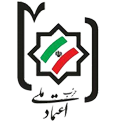National Trust Party | |
|---|---|
 | |
| Secretary-General | Elias Hazrati |
| Spokesperson | Esmaeil Gerami-Moghaddam[1] |
| Founder | Mehdi Karroubi |
| Legalized | 13 August 2005[2] |
| Headquarters | Tehran, Iran |
| Newspaper | Etemad-e Melli[3] |
| Ideology | |
| Electoral alliance |
|
| Tehran City Council | 3 / 21 |
| Isfahan City Council | 1 / 13 |
| Shiraz City Council | 1 / 13 |
| Website | |
| etemad-melli | |
National Trust Party (Persian: حزب اعتماد ملی, romanized: Ḥezb-e Eʿtemād-e Mellī, also translated as National Confidence Party)[5][6][7] is an Iranian political party based on a reformist and populist message.[8]
It was established in 2005 by former Parliament speaker Mehdi Karroubi following his defeat in 2005 presidential election.[9] National Trust Party cooperates with the Reformists' Supreme Council for Policymaking.[10]
- ^ "Iran Clamps Down On Opposition Leaders". AP. CBSNews. 17 July 2012. Retrieved 14 February 2011.
- ^ Bill Samii (1 September 2005), Iran: Political System Undergoes Major Changes, Radio Free Europe/Radio Liberty, retrieved 15 May 2017
- ^ VOA News (August 17, 2009). "Iranian Police Clash With Protesters Over Banned Newspaper". Voice of America. Archived from the original on August 19, 2009.
- ^ a b Khani, Mohamamd Hassan (17 July 2012). "Political Parties in the Islamic Republic of Iran". Iran Review. Retrieved 1 April 2016.
- ^ Gunes Murat Tezcur (2010). Muslim Reformers in Iran and Turkey: The Paradox of Moderation. The University of Texas Press. pp. 120, 202–203. ISBN 978-0-292-72197-5.
- ^ "Political Factions Competing in Iran's Parliamentary Elections". The Jerusalem Post. 14 March 2008. Retrieved 1 March 2017.
- ^ Razavi, Reza (2010), "The Road to Party Politics in Iran (1979–2009)", Middle Eastern Studies, 46 (1): 79–96, doi:10.1080/00263200903432274, ISSN 1743-7881, S2CID 144106165
- ^ Kaveh-Cyrus Sanandaji (Middle East Center, St. Antony's College, University of Oxford) (April 24, 2009). "What Reformists Can Learn From Past Failures". National Democratic Institute.
Karroubi continues to expound a populist message
{{cite web}}: CS1 maint: multiple names: authors list (link) - ^ Muhammad Sahimi (12 May 2009). "The Political Groups". Tehran Bureau. Retrieved 21 August 2015.
- ^ Caitlin Shayda Pendleton (23 September 2016), "Iran 2017 Presidential Election Tracker", AEI’s Critical Threats Project, retrieved 5 May 2017